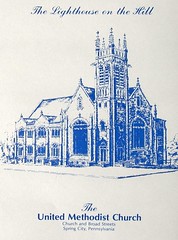Ask A Pastor: What's UP with denominations?
July 1, 2007
from 1 Corinthians 1:10-12, 3:5-9 and Mark 9:33-41
"For we are God’s servants, working together…" - 1 Corinthians 3:9
My sermon outline:
• Questions, What’s Up with denominations, why are there so many different kinds of churches? And really, what’s the difference? Some of your responses (same Bible, same God, same songs, community)
• Can you imagine if Jesus’ body had been left behind, the church would’ve become its stewards… can you imagine if there was a disagreement over where and how to keep and honor the remains?
• Story of confirmation class to Catholic church. A priest answered "what's the difference between us?" by saying: The very thing that should unite us is that which divides us. Sad, but true.
• Cover of bulletin shows a religious family tree. At the base of this tree is the Great Schism, in 1054, and over the course of 600 years you make a left and a right and you end up in The United Methodist Church. Today I’m going to focus on two questions that cause the different branches to happen: Where is the authority, and what is believed?
• Church started with the Apostle Peter, who took the Good News to Rome, and Apostolic authority and tradition – Rome becomes the seat of the Church. As the church grew during the first 1,000 years, there were other regional bishops, and controversy arose over whether the Bishop of Rome had authority over bishops. Where is the authority? In 1054 the church split, in part because of Roman hierarchy (West ^ East /-\), and in part because of question two, what is believed: specifically, where’s HS come from? From Father alone, or from Father and Son?
• Church has spread throughout Europe, and in Germany in 1517 Martin Luther, a Catholic monk, publicly protests some teachings of the Church, including indulgences. Justification is by grace alone through faith in Jesus Christ. Both a question of authority (Pope or Bible?) and belief (grace or works?) and Protestant Reformation is kindled. Lutheran church is born.
• 1534 Henry VIII, himself Catholic, seeking an annulment of marriage so he could marry Anne Boleyn and have an heir, Pope denied. Henry declares himself head of Church in England.
• 1560 a third major break from the papacy, this time in Scotland, adhering to the teachings of another Reformer, John Calvin. The Presbyterian Church was born. One question of belief that came up in the Protestant Reformation was the issue of how to observe Lent: the Catholic Church practiced abstinence from meat during Lent, and one early Reformer, seeing no biblical mandate for it, protested by eating sausage!
• So far the different churches have similar hierarchies with either one person at the top or a council of equal persons at the top, and priests and local congregations at the bottom. In 1580 some churches break from Church of England that give authority to the local congregation, and Congregational Churches are born. In 1608 there’s another division of the Church of England and the Baptist church is born.
• Included in the splits are questions surrounding the sacraments: what happens in Communion, what happens in Baptism, who may commune, who may be baptized. Questions about salvation (earn it or receive it? lose it?) and predestination (do people have any choice?) And worship wars have been happening for centuries concerning the use of instruments in worship and how decorated the sanctuary should be.
• What difference do these make? Example: force-rank God’s grace v. power.
• Also: pastoral leadership styles. clergy v. lay? Charismatic leader under episcopacy? vice-versa?
• John Wesley Church of England priest in 1725, zealously sought to practice faith in community, social justice plus personal piety, self-examination plus accountability. So zealous was he to teach the Gospel to anyone who would hear it that he began preaching wherever people would gather, regardless of whether it was in a church. He even authorized laypersons to preach the word, so that none should be lost. As the American colonies gained their independence from Britain, he realized the importance of passing on ecclesial authority, and the Methodist Church was birthed in Baltimore, after Christmas of 1784.
• Methodist Church maintains a system of authority like the Church of England, with local congregations clustered in districts, districts clustered in Annual Conferences under one bishop, and a council of coequal bishops at the top. Unique to Methodist policy is the equal voice of the lay.
• Signature elements of Methodism include the Wesleyan Quadrilateral, in which the living core of the Christian faith is revealed in Scripture, illumined by tradition, vivified in personal experience, and confirmed by reason. Also the path to salvation of Prevenient Grace, Justifying Grace, and Sanctifying Grace. Wesley believed that by sanctifying grace we are going on to perfection – that is, one may attain “perfection in love” in this lifetime.
• So that’s it in a nutshell, why there are denominations and some of the things that are distinct about Methodism. I was raised UCC, schooled Lutheran, married Methodist. UCC seminary, learned that it was in Methodism’s polity and theology that I was most comfortable, and I believe God is using people of many denominations as God’s servants, working together.
• 437 This Is My Song
- Pastor Kerry
This Sunday: 66 in worship. Nice weather. Communion Sunday.


0 Comments:
Post a Comment
<< Home